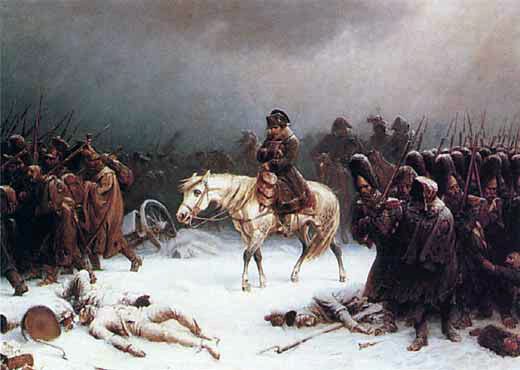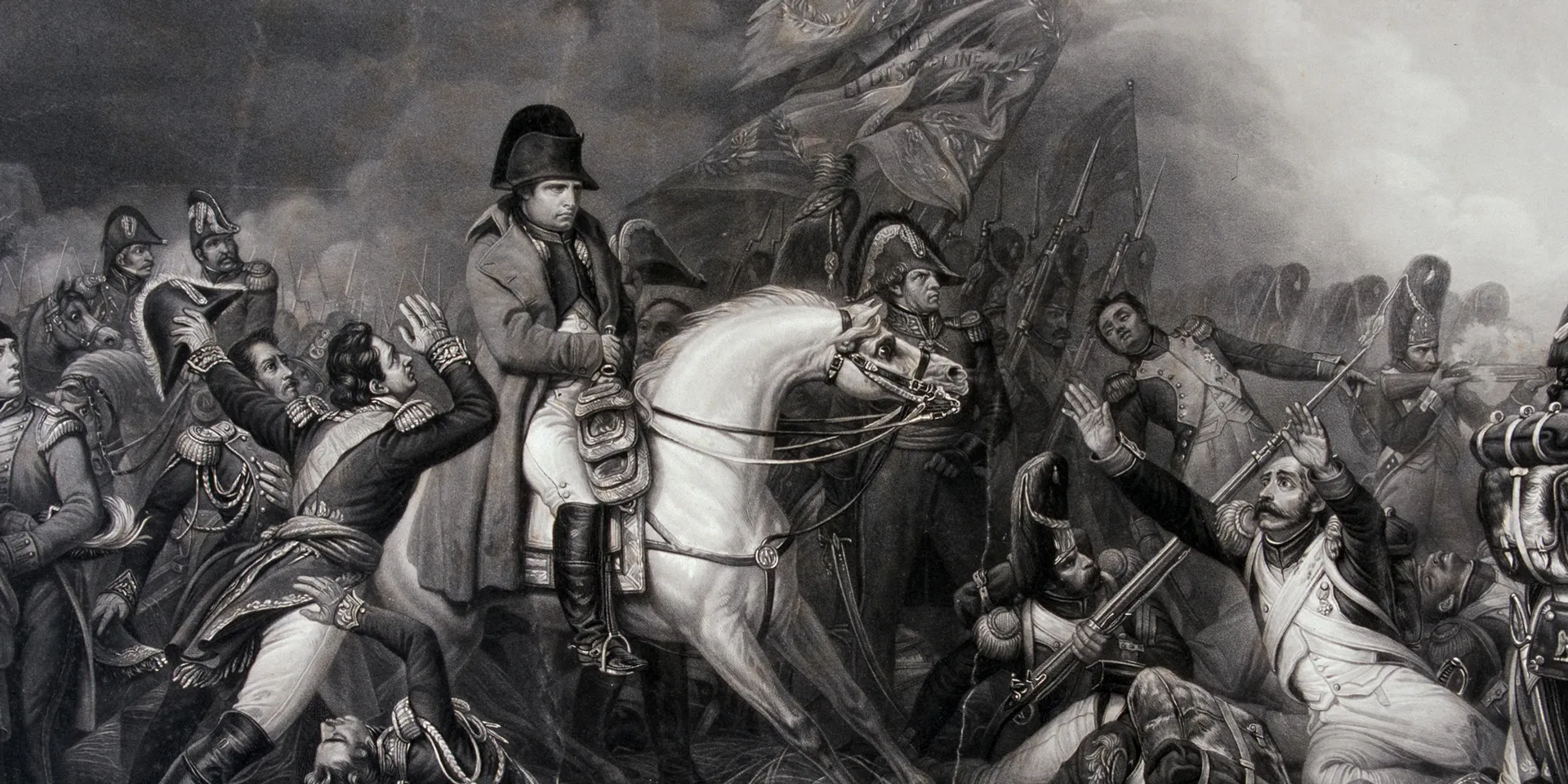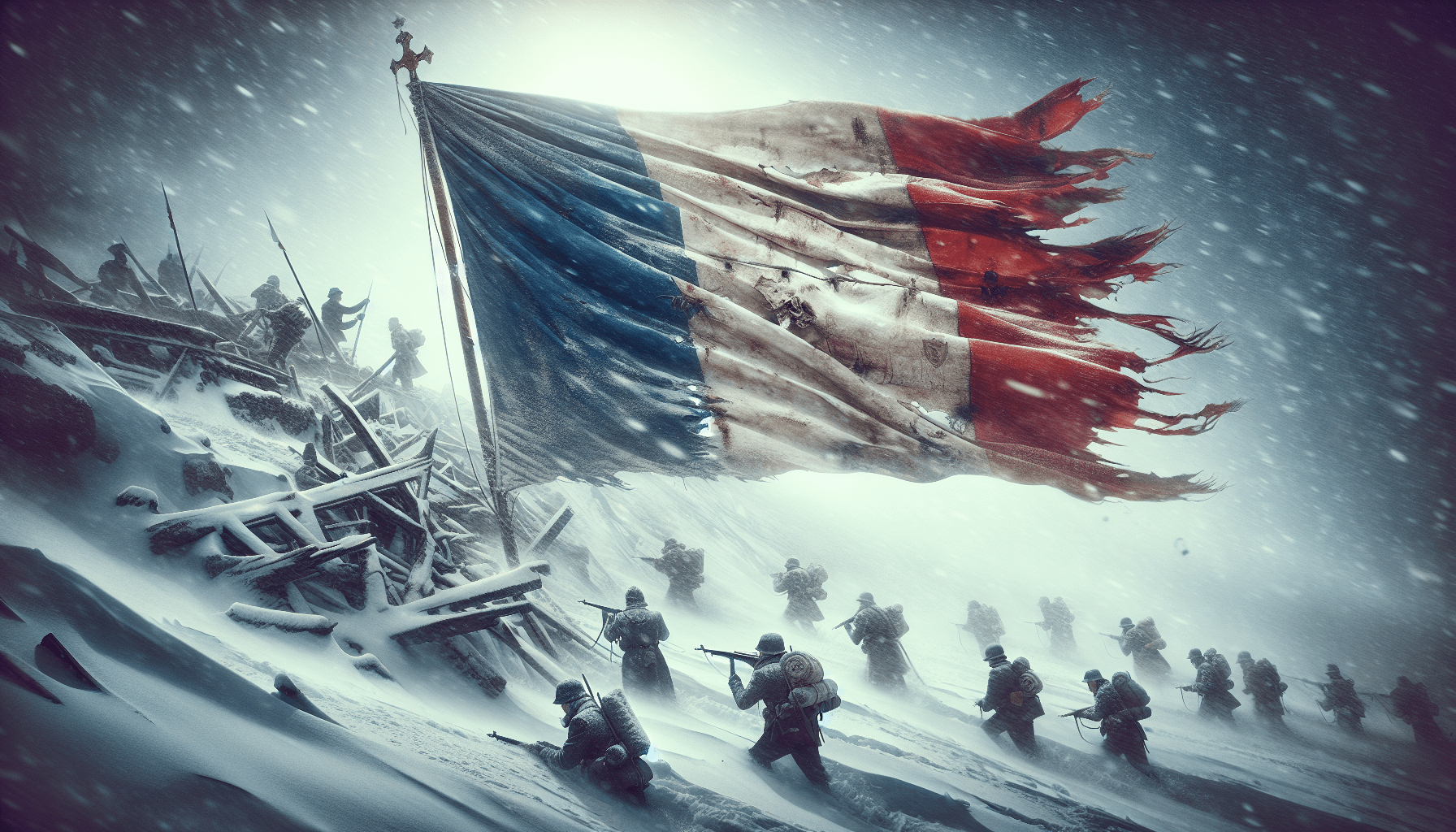The aftermath of Napoleon’s calamitous retreat from Russia marked a turning point in his military endeavors, leading to substantial losses that would shape the subsequent campaign in Europe. With an estimated 500,000 men and 175,000 horses lost, Napoleon’s forces faced mounting challenges, primarily fueled by a burgeoning anti-Napoleonic coalition comprised of nations such as Prussia, Russia, and Britain. Despite these setbacks, Napoleon persisted in his ambition to restore his dominance, particularly in the German territories, leading to a series of pivotal battles from 1813 onward.
The ensuing conflicts revealed a dynamic battlefield characterized by significant confrontations, including the Battles of Leipzig and Bautzen, where Napoleon encountered formidable resistance from the coalition forces. As the campaign progressed, shifting alliances and rising sentiments of nationalism among German states further complicated Napoleon’s strategic position. This article meticulously examines the factors that culminated in Napoleon’s defeats, highlighting key battles, leadership changes, and the evolving geopolitical landscape that ultimately contributed to his declining influence in Europe.
Napoleon’s Strategic Implications Post-Russian Retreat
Overview of the Russian Retreat and Its Impact on Napoleon
After the catastrophic retreat from Russia in 1812, wherein Napoleon’s Grand Army suffered staggering losses—approximately 500,000 men and 175,000 horses—Napoleon was propelled into a defensive posture that reshaped his military strategy. This retreat was not merely a momentary setback but heralded the beginning of the decline of French dominance over Europe. The winter conditions and relentless Russian tactics decimated his forces, and as the remnants of his army returned to French territory, the once invincible aura surrounding Napoleon began to wane. His military prowess, previously unmatched, was now marked by vulnerability, necessitating a comprehensive review of military tactics and deployment strategies.
Losses Sustained: Troop and Resource Depletion
The toll from the Russian campaign was profound not only in lives lost but also in the depletion of resources essential for maintaining an effective military presence in Europe. The heavy casualties from the retreat resulted in an army that was drastically under-resourced, both in terms of manpower and strategic capabilities. Napoleon was no longer able to rely upon the overwhelming force that had characterized his previous campaigns. Instead, he faced the arduous task of recruiting and training new troops from an exhausted France, which had already borne the brunt of previous conscription efforts. This depletion had crippling effects on both morale and operational readiness.
Strategic Reevaluation: Changes in Military Tactics Post-Retreat
Faced with these challenges, you find that Napoleon was compelled to reassess the military tactics that had previously brought him success. The failure in Russia emphasized the need for a decentralized command structure that allowed for greater flexibility in operations. Additionally, the necessity of better logistical planning came to the forefront, considering the logistical nightmares experienced during the retreat. His tactics began to blend rapid advances with strategic withdrawals, aiming to leverage the remaining experienced soldiers while integrating fresh recruits into a cohesive fighting force.
Immediate Consequences of the Russian Campaign
Loss of Morale Among Troops
The immediate aftermath of the Russian campaign saw a palpable decline in troop morale. Soldiers who had once fought with fervor began to question their leader’s strategies and the feasibility of waging further military campaigns. The realization that their comrades had perished in appalling circumstances fostered an environment of despair and cynicism within the ranks. Veteran soldiers, having witnessed the catastrophic retreat, were less inclined to engage in subsequent battles, leading to a cycle of low morale that Napoleon needed to address.
Logistical Challenges in Reinforcing the Army
As you analyze the aftermath, logistical challenges became increasingly evident, impeding Napoleon’s ability to reinforce his army adequately. The supply lines that had once been robust were now strained, requiring innovative solutions to transport goods and personnel. With the flight of seasoned officers and supply chain disruptions, maintaining the flow of ammunition, food, and equipment proved arduous. As his forces prepared for the upcoming engagements, Napoleon was tasked with establishing a renewed infrastructure to support what remained of his military capabilities.
Impact on French Public Perception and Propaganda
The impact on public perception in France was another critical factor following the Russian retreat. The populace, initially supportive of their Emperor’s ambitions, began to encounter a wavering sense of confidence regarding France’s military endeavors. Propaganda efforts were ramped up in an attempt to bolster national pride and distract from the grim reality of the losses sustained in Russia. Napoleon’s regime sought to galvanize the French spirit, emphasizing the narrative of resilience and positioning future campaigns as necessary for reclaiming national honor.

Motivations Behind Napoleon’s Continued Campaigns
Aims to Reassert French Dominance in Europe
With the specter of defeat lingering, you realize that Napoleon’s steadfast commitment to further campaigns stemmed from a desire to restore French hegemony in Europe. Energized by a belief in his destiny, Napoleon sought to reaffirm not only his power but also France’s status as a major European power. The ambitions of reclaiming territories and asserting dominance over Central Europe underpinned his strategic decision-making in the immediate years following the retreat.
Desire to Regain Lost Prestige Among Allies
Navigating the complex political waters following the retreat necessitated an effort to regain lost prestige among his allies. The loss in Russia had significant geopolitical repercussions, prompting former allies to reassess their positions in relation to France. For Napoleon, it was imperative to demonstrate that he still commanded military effectiveness and could deliver strategic successes, thereby reigniting the loyalty of wavering allies who might otherwise lean towards the growing coalition opposing him.
Influence of Political Pressures and Cabinet Dynamics
Your examination of the political landscape reveals that internal dynamics within Napoleon’s cabinet played a pivotal role in shaping his decisions. Faced with increasing pressure from advisors and military commanders, each advocating divergent strategies, Napoleon’s military direction became increasingly contentious. The need to project unity and resolve, amidst the backdrop of mounting opposition, meant that he needed to ensure his campaigns were framed as not only military necessities but also as responses to broader political stakes.
Key Battles in 1813: Turning Points in the Campaign
Analysis of the Battle of Lützen: Early Victories
In the spring of 1813, the Battle of Lützen emerged as a significant contest in Napoleon’s campaign. Despite facing a coalition army comprised of Russian and Prussian forces, you find that Napoleon’s tactical prowess allowed him to secure a hard-fought victory on May 2. The battle illustrated his continued ability to effectively maneuver troops despite the ongoing challenges from previous campaigns. However, the victory came at a staggering cost, emphasizing the fragility of his situation and foreshadowing the rising effectiveness of coalition forces.
Significance of the Battle of Bautzen and its Aftermath
The subsequent Battle of Bautzen on May 20, 1813, presented another critical juncture. Despite initial French successes, coordination issues among commanders limited the potential for a decisive victory. As you analyze the aftermath, it becomes evident that although the French emerged victorious, the inability to effectively pursue and decisively engage the retreating coalition left lingering vulnerabilities. The battle highlighted the shifting dynamics of warfare, as coalition forces learned to adapt to French strategies, complicating Napoleon’s efforts to maintain supremacy on the battlefield.
The Decisive Blow: Outcomes of the Battle of Leipzig
The Battle of Leipzig, held from October 16 to October 19, marked a turning point in the campaign and, consequently, in the Napoleonic Wars. This confrontation, characterized by its scale and ferocity, resulted in a monumental defeat for Napoleon. Your assessment of this battle underscores its significance as a collective demonstration of the coalition’s strength and resolve, as they combined forces to outnumber and outmaneuver the French. Following this decisive blow, Napoleon’s capacity to project power in Europe was fundamentally undermined, leading to long-lasting repercussions in the realm of European geopolitics.

Coalition Dynamics and Growing Opposition
Formation of the 6th Coalition Against Napoleon
In the wake of Napoleon’s retreat, the 6th Coalition began to coalesce as nations sought to counterbalance French power. Your observations indicate that this alliance included Prussia, Russia, Austria, and a host of other nations, each united in their opposition to Napoleon’s ambitions. The growing coalition reflected a significant organizational shift, as these countries recognized the collective strength against a common foe could yield results unattainable in isolation.
Prussia’s Shift: Factors Influencing Their Change in Allegiance
Prussia’s shift from an ally of Napoleon to a pivotal member of the coalition underscores the fragility of political alliances. As you delve into the factors behind this change, it becomes apparent that military defeats, coupled with rising nationalistic sentiments among the populace, fueled demands for reengagement against French dominance. Disillusionment with Napoleon’s leadership and the promise of national renewal played crucial roles in Prussia’s decision, catalyzing other states to consider similar courses of action.
Role of Nationalism in Uniting the Coalition Forces
The rise of nationalism served as a formidable force uniting the coalition against Napoleon. Your analysis indicates that many viewed the conflict as a struggle for liberation from French rule. Nationalistic sentiments inspired a broader populace to mobilize in support of the coalition’s aims, enhancing recruitment efforts and bolstering the resolve of soldiers. This collective identity shifted the conflict from one of mere territorial disputes to a struggle for national sovereignty, adding layers of complexity to the dynamics at play for Napoleon.
Military Leadership and Decision-Making
Key Figures: Tsar Alexander and Field Marshal Kutuzov
The leadership within the coalition was crucial to its effectiveness against French forces. Tsar Alexander’s unwavering determination, complemented by the tactical insights of Field Marshal Kutuzov, encapsulated the strategic depth the coalition brought to bear. Their ability to integrate diverse military forces and coordinate tactical operations played a vital role in undermining Napoleon’s strategies, as their leaders adapted to counter his unpredictable approaches.
Leadership Changes within the Coalition’s Command Structure
You observe that leadership changes within the coalition command structure significantly impacted operational strategies. The replacement of leaders such as Kutuzov with new commanders meant shifts in strategic focus and tactics. These transitions reflected ongoing challenges in command dynamics, with each leader bringing their philosophies and strategies tailored to countering Napoleon’s advances, further complicating his operational decisions.
Impact of Command Disputes on Strategy and Engagements
Despite the overall unity of the coalition forces, internal command disputes emerged, casting shadows over strategic engagements. Disagreements on tactical decisions created opportunities for the French, threatening the coherence of coalition operations. Your exploration of these disparities highlights the delicate balance required to maintain an effective and united front against Napoleon, stressing how factionalism jeopardized prolonged military operations.

Resource Mobilization and Military Readiness
Conscription Efforts: Raising New Troops
To combat the urgent need for military personnel, both sides embarked on ambitious conscription efforts. You will note that Napoleon’s call for new recruits from the draft classes of 1813 and 1814 aimed to replenish the ranks left devastated by earlier campaigns. However, the quality of these new troops raised concerns, as many were poorly trained and inexperienced, presenting challenges in cohesive military engagements.
Quality Versus Quantity: Challenges in Training New Recruits
Amidst the call for numbers, a pressing dilemma persisted around quality versus quantity. You will find that new recruits often struggled under the standard of training that had fostered Napoleon’s earlier successes. This discrepancy in preparedness proved detrimental in engagements, as historical precedents underscored the efficacy of experienced soldiers over sheer numerical strength. This balance played a critical role in the unfolding dynamics of the 1813 campaigns.
French Military Reinforcements: Dependency on Satellite States
An overarching dependency on satellite states for reinforcements created additional layers of complexity for Napoleon’s military strategy. As you analyze the situation, it becomes clear that while these alliances bolstered numbers, they were often fraught with logistical challenges. Satellite states brought varying degrees of commitment and competency, which further complicated the mobilization of effective military forces to support French ambitions in an increasingly hostile landscape.
The Role of Nationalism in the 1813 Campaign
Emergence of German Liberation Movements
As the campaign progressed, you would note a pronounced emergence of German liberation movements aimed at shaking off the yoke of French domination. This awakening was characterized by an increasingly fervent desire among the German states to assert their national identity and autonomy. The growing sentiment of liberation fostered unity against French rule, enhancing recruitment efforts for coalition forces and redefining the narrative of the conflict.
Influence of Cultural Sentiments on Military Engagement
Cultural sentiments acted as undercurrents informing military engagements on both sides of the conflict. You will observe that the coalition exploited themes of national pride and sovereignty, galvanizing support for the war against Napoleon’s forces. This cultural mobilization lent an emotional weight to the military engagements and highlighted the belief that liberating German territories was a noble endeavor, fostering greater local support for the coalition.
Defending Against French Dominance: The Coalition’s Narrative
You recognize that the coalition’s narrative framed their cause as one of defense against tyranny, aiming to protect the rights and autonomy of various German states against French encroachment. This portrayal served not only as a motivational tool but also as a strategic narrative designed to consolidate domestic support for the war effort. By packaging their military engagement as a defense of freedom, the coalition successfully created a compelling justification for their military actions.

Turning Tide: Successes and Failures on the Battlefield
Strategic Missteps Leading to French Defeats
The dynamic shifts on the battlefield were not devoid of missteps on France’s part. You identify a series of strategic errors—poor reconnaissance, miscommunication among commanders, and underestimating coalition resolve—as pivotal in the unfolding sequence of defeats. The impact of these strategic miscalculations became evident in the increasing effectiveness of coalition forces, compounding the difficulties faced by Napoleon’s remaining troops.
Coalition Adaptations in Tactics Post-Lützen
In response to previous failures at Lützen and Bautzen, the coalition adapted its tactics to exploit the weaknesses of the French. The integration of fresh infantry and improved communication among allied forces allowed for coordinated efforts that successfully challenged Napoleon’s traditional approaches. Your analysis highlights that these adaptations were critical in staving off further French advances, turning the tide in favor of the coalition.
Victory and Loss: The Significance of the Battle of Kulm
In this context, the Battle of Kulm serves as a critical episode that encapsulated the shifting dynamics on the battlefield. Despite facing a numerically superior French force, the adeptness of the coalition troops enabled them to execute a well-coordinated defense. As you examine the outcomes, both sides sustained heavy casualties, yet the allied ability to regroup and launch a counteroffensive marked a pivotal moment indicative of their increasing military efficacy against Napoleon.
Conclusion: The Aftermath of the 1813 Campaign
Assessment of Napoleon’s Declining Power in Europe
In the aftermath of the 1813 campaigns, you come to a somber realization: Napoleon’s power in Europe had significantly waned. The catastrophic losses and strategic miscalculations created a climate where his enemies felt emboldened, rallying around the collective goal of dismantling French imperial ambitions. The once-legendary figure now faced the stark challenge of rekindling confidence in his leadership amid mounting opposition.
Impact of Casualties on French Military Strategy
You assess that the extensive casualties suffered during this campaign drastically reshaped French military strategy. The erosion of experienced military leaders coupled with the rise of fresh, unseasoned troops underscored the necessity for a reevaluation of operational tactics going forward. As your exploration of this period unfolds, it becomes clear that the French military had to adapt, cultivating resilience amidst ongoing adversity.
Future Implications for European Politics and Warfare
As you conclude, it is evident that the 1813 campaign not only signaled a turning point in the Napoleonic Wars but also set the stage for radical changes in European politics and military warfare. The shifting allegiances, burgeoning nationalism, and evolving military strategies established a new geopolitical landscape, one that would haunt Napoleon and contribute to the larger conflicts to come. The implications of 1813 reverberated through time, foreshadowing the eventual downfall of one of history’s most formidable military leaders.

